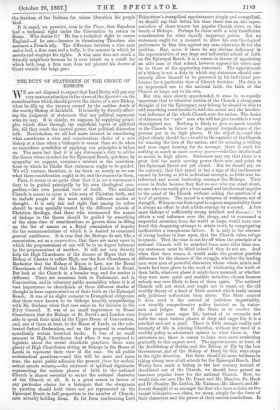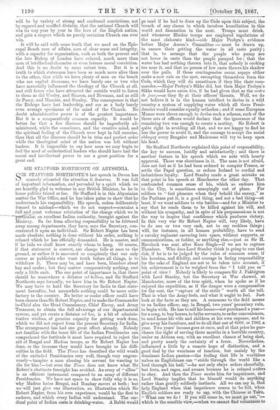THE DUTY OF STATESMEN IN THE CHOICE OF BISHOPS.
NVE are not disposed to expect that Lord Derby will pay any very anxious attention to the views of the Spectator on the -considerations which should govern the choice of a new Bishop, when he fills up the vacancy caused by the sudden death of the worthy Bishop of Lichfield. It is hardly by directly affect- ing the judgment of statesmen that any political argument wins its way. It is chiefly, we suppose, by supplying princi- ples which filter through the superficial, layers of political life, till they reach the central power, that political discussion tells. Nevertheless, we all feel more interest in considering -what constitutes 'a wise and conscientious choice of a new bishop at a time when a bishopric is vacant than we do when no immediate possibility of applying our principles is before us. The mere fact that it is any statesman's duty to advise the Queen whom to select for the Episcopal Bench, quickens, by sympathy we suppose, everyone's interest in the considera- tions by which he thinks that statesmen ought to be guided. 'We will venture, therefore, to lay down as nearly as we can what these consideration ought to be, and the reasons for them.
First, it seems to us quite clear that it is not a statesman's clay to be guided principally by his own theological sym- pathies,—his own personal view of truth. The national 'Church is meant to cover a wide area of Christian faith, and to include people of the most widely different modes of thought. It is only fair and right that among its rulers should be men specially trusted by the different schools of 'Christian theology, that those who recommend the names of bishops to the Queen should be guided by something of the same class of considerations as govern them in filling up the list of names on a. Royal commission of inquiry for the recommendations of which it is desired to command _general confidence. It is true that the Bishops do not, like a commission, act as a cmporation,that there are many cases in which the prepossessions of one will be in no degree balanced by the prepossessions of another. It will not very directly help the High Churchmen of the diocese of Ripon that the :Bishop of Chester is rather High, nor the Low Churchmen of Rochester that the Bishop of Ripon is Low, nor the Broad Churchmen of Oxford that the Bishop of London is Broad. But look at the Church in a broader way, and the matter is .different. There are occasions both in Parliament, and in Convocation, and in voluntary public assemblies, where it is of vast importance to churchmen of these different shades of thought to have representatives of their faith on the Episcopal Bench. It was of no slight moment to Evangelical clergymen that there were known to be bishops heartily sympathizing with Mr. Gorham when that case came on for decision in the :Privy Council. It was of no small importance to Broad Churchmen that the Bishops of St. David's and London were able to speak their mind in the Upper House of Convocation, and, one of them at least, in the House of Lords, on the cele- brated Oxford Declaration, and on the proposal to condemn .synodically certain heretical books. It was of no small moment to High Churchmen that when it was proposed to legislate about the recent ritualistic practices, there were plenty of High Churchmen sitting as bishops in the House of Lords to represent their view of the case. On all public ecclesiastical questions,—and this will be more and more true, the more public adhesion the present furor for ecclesi- astical synods secures,—the existence of spiritual dignitaries representing the various phases of faith in the national Church is almost essential to secure the national character .of the Church at all. It is a great reason in favour of any particular choice for a bishopric that the clergyman in question should hold views not yet represented on the Episcopal Bench in full proportion to the number of Church- men actually holding them. So far from condemning Lord Palmerston's evangelical appointments simply qua evangelical, We should say that before his time there was no fair repre- sentation of those narrow but popular Church. views on the bench of Bishops. Perhaps he chose with a very insufficient consideration for other equally important points. But no statesman ought for a moment to allow his own theological preferences to bias him against any man otherwise fit for the position. Nay, more, if there be any obvious deficiency in the representation of any large and influential school of faith on the Episcopal Bench, it is a reason in favour of appointing an able man of that school, however opposed his views may be to those of the appointing statesman. The appointment of a bishop is not a duty in which any statesman should con- sciously allow himself to be governed by his individual pre- ference for a particular view of Church doctrine. His duty is an impersonal one to the national faith, the faith of the Church at large, not to his own.
But this once clearly apprehended, it sems to us equally important that to whatever section of the Church a clergyman thought of for the Episcopacy may belong, he should be able to add something considerable to both the moral and the intellec- tual influence of the whole Church over the nation. The desire of statesmen for " safe " men who will not give trouble is a very shortsighted one. Nothing is likely to give so much trouble to the Church in future as the general insignificance of the persons put in its high places. If the object is,—and the object clearly should be,—to add to the capacity of the Church- for winning the love of the nation, and for securing a willing and even eager hearing for its message, there is need for nothing so much as more moving power—whether intellectual or moral, in high places. Statesmen may say that there is a great deal too much moving power there now, and point to this Episcopal Synod not yet closed. But we should say, on the contrary, that that synod is but a sign of the restlessness caused by having so little individual strength, so little true in- tellectual and moral leadership amongst the Bishops. They cower in flocks because they find no one who can stand alone, no one who can really give a true moral and intellectual impulse to the mind of the Church without asking the sanction of a herd of prelates. The synod is a sympton of weakness, not of strength. When no one feels equal to a great responsibility there is always an effort to club a little courage by a crowd. A few more bishops of sufficiently strong intellect and chstaetz., to obtain a real influence over the clergy, and to command a respectful attention from the world at large, would have ren- dered this despairing attempt to attain truth by congregating mediocrities a conspicuous failure. It is only in the absence of strong leaders to lean upon, that the Church takes refuge in synods. That the time is not far off when the principle of a national Church will be attacked from more sides than one,. our statesmen must be blind indeed if they do not see. And when that time comes, it would make the greatest possible difference for the chances of the struggle, whether the leading men were men of powerful character, whose whole minds and hearts had been given to the work of vindicating the truth of their faith, whatever phase it might have assumed, or whether they were mere quiet and amiable nobodies, chosen because nobody was ever likely to hear of them again. The national Church will not stand, and ought not to stand, on the old worldly theory of a kind of State control which really means only judicious suffocation from above. The State control it does need is the control of judicious impartiality, —a steadily comprehensive policy insisted on by states- men and judges. But if the State is to smother the deepest and most eager life, instead of to reconcile and unite the most various phases of deep and eager life, it is a mischief and not a good. There is little enough reality and intensity of life in existing Churches, without any need of a worldly policy to administer opiates to what there is. Our statesmen are, there is reason to hope, once more awakening gradually to this urgent need. The appointments, at least, of the Archbishop of Dublin and the Bishop of Ely by the last Government, and of the Bishop of Derry by this, were steps in the right direction. But there should be more boldness in taking strong men of all schools for the Episcopal Bench. Had Wesley been made a bishop in the last century instead of shouldered out of the Church, we should have gained an immense popular force for the national Church. Now, we would fain see men like Dr. Pnsey and Mr. Maurice, Dr. Hook and Dr. Stanley, Mr. Liddon, Mr. Cadman, Mr. Manse', and Mr Jowett thought of as amongst the first who have a claim on the vacant bishoprics,—a claim, we mean, simply for the force of their characters and the power of their various convictions. It will be by variety of strong and confessed convictions, not by sugared and muffled divinity, that the national Church will win its way year by year in the love of the English nation, and gain a respect which no purely sectarian Church can ever win.
It will be said with some truth that we need on the Epis- copal Bench men of affairs, men of clear sense and integrity, with a capacity for organization, such as both the present and the late Bishop of London have evinced, much more than men of intellectual character or even intense moral conviction. And this is no doubt to some extent true. But it is a truth to which statesmen have been so much more alive than to the other, that while we have plenty of men on the bench who are capital diocesans, we have barely one or two who have materially influenced the theology of the Church at all, and still fewer who have attracted the outside world to listen to them as did Wesley, and Simeon, and Newman, and as still do Pusey, and Maurice, and Stanley. The consequence is that the Bishops have lost leadership, and are as a body barely even average specimens of the mind of the Church. No doubt administrative power is of the greatest importance. But it is a comparatively common capacity. It would be better far that a few dioceses should be imperfectly ad- ministered, while the conscience, and the creative mind, and the spiritual feeling of the Church were kept in full exercise, than that all the dioceses should be in trim and perfect order while the theological mind of the nation was left without leaders. It is impossible to say how soon we may begin to feel the need of ecclesiastical leaders who should have had the moral and intellectual power to use a great position for a great end.



































 Previous page
Previous page